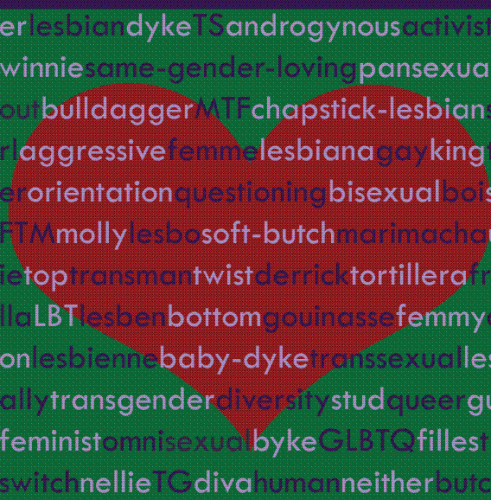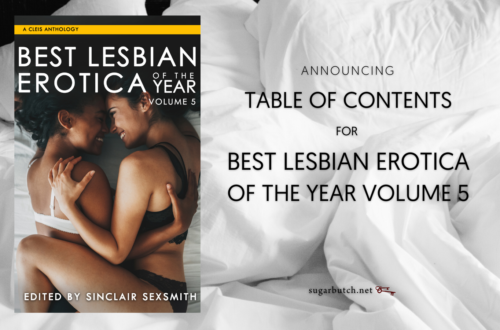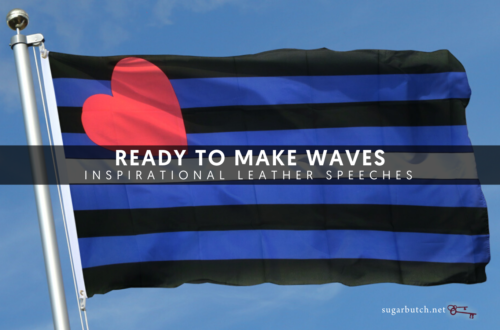This site contains explicit writings on kink practices, dominant/submissive relationships, and queer kink erotica (among other things). All characters in role play or non-consent scenes are consenting adults. Content warnings are included.
Personally I am extremely grateful to have grown up in a culture where the women’s health movement had already had significant effects and waves. I went to teen-positive health centers for my first annual exams and birth control prescriptions, I went to queer-positive centers after I came out who didn’t blink twice when I checked “lesbian” on the forms.
And, honestly, Lesbian Health and Women’s Health are big – huge! – topics on which I am not so well-versed. Breast cancer, cervical cancer, HIV prevention, the myths around lesbians being less susceptible to STIs, safer sex practices, gender discrimination, transphobia … these are huge topics, each of which are worthy of their own examination.
And lucky for us, there are many wonderful people working within these fields to make it more lesbian-inclusive, queer-inclusive, gender-inclusive.
Today is Blog for Lesbian Health Day in honor of the upcoming National Lesbian Health Summit taking place March 6 through 8, 2009, in San Francisco. It’s only $30 registration for both days.
(Anyone have any plane-fare hookups? I’d love to go, but can’t afford to actually get there. Note to self, get an airline sponsor.)
I’ve been in touch with Cat, one of the organizers of the conference, and she writes:
Instead of it being just a boring conference, we want to use it as a place to build grassroots, community-based conversations on our health and what health issues affect us. AND most importantly, how we can be leaders in championing our health and getting TPTB to pay attention to our health. This is a critical moment in our nation’s history and we want to make the most of it.
The thing that is probably #1 on my list about health, as a, ahem, sexually active queer person, is STIs and safer sex. It’s something that I always intend to write about more here, to address issues how to keep your toys clean, reminders to wear gloves and use dams and condoms, but it’s a topic that – again – is HUGE, and I tend to feel like I need to do a whole bunch of research on something before I write it up, and I can’t seem to make the time to do the research. (I do practice safer sex, and I try to include it in my write-ups … but that’s not quite the same as opening up a specific dialogue about it.)
So let me take this little opportunity to say: EDUCATE YOURSELF ABOUT SAFER SEX. There are many ways to do this. I recommend Scarleteen – though it is geared toward teenagers, the information is clear and straightforward, basic, and in-depth, and I often use it as a resource when I come across health questions that I can’t answer.
So, instead of writing about my own experiences with the healthcare systems (which have been mostly positive, actually) or speculating too much about the community questions, I want to ask you:
What health issues are you concerned about? For yourself and for your community?
What information do you need to make better decisions about your health?
And what experiences have you already had with your health and the healthcare world (the good, the bad, the ugly)?
What do health issues do we need to take on and how?
How can we better grapple with how we form who we are (allowing for all of the ways we see ourselves) and let that lead our conversations on health?
What do you want to see this summit address?
Do you want to take them to task for calling it the Lesbian Health Summit? Is it welcoming to your particular identity?
If you’d like, leave your stories in the comments, or write it up on your own blog – and please do leave a link to what you write here.
Register online for the Summit now, or visit their website for more information.





What health issues are you concerned about? For yourself and for your community?
Various STD's seem to be coming and going like fashionable hemlines in the gay men's community and that worries me a lot, not just for myself but for younger up-and-coming queerlings who don't seem to have the same stringent requirements of their partners in regards to same-sex. It's like the further you are from Ground Zero of the big epidemic of AIDS is the 80's, the looser you play with the rules of staying safe.
What information do you need to make better decisions about your health?
I would love more information about safer sex practices as they relate to transpeople, particularly transmen.
And what experiences have you already had with your health and the healthcare world (the good, the bad, the ugly)?
I've been tested, and they were very nice about it. I have had an unremarkable health history, which is just as well if you ask me.
What do health issues do we need to take on and how?
Such a huge variety…let's start with preventative education for youth, remedial education for those in their 20's and beyond. People are having casual sex later and later in their lives, we should not ignore their lack of information.
How can we better grapple with how we form who we are (allowing for all of the ways we see ourselves) and let that lead our conversations on health?
Finding and supporting queer-friendly healthcare is obviously the biggest step. But we should also try to inform our healthcare providers if they seem receptive to it. If you like the person you see you should see about keeping them but helping them to help you better. It's about being visible. Which you'd think would be fairly evident when you're fanny-to-the-wind in a paper dressing gown, but there you go.
What do you want to see this summit address?
I think that this summit has a great goal, one that gets ignored too frequently by mainstream PSA's and the like which seem to focus on racial diversity above all other types. I would love to see a small (or big!) force come out of this summit to help create media that reaches out to our community, the queer community. If I saw a commercial of breast cancer survivors that included a lesbian couple, I'd be a bit weepy I don't mind saying.
Do you want to take them to task for calling it the Lesbian Health Summit? Is it welcoming to your particular identity?
It's not particularly welcoming, even though I tend to assume I'm welcome anywhere that I'm not specifically unwelcome at. I would love to see similar summits to address other identities or even to have one giant conference for everybody but that might be hard to pull together.
I remain surprised how little my straight feminist MD knows about lesbian health issues. She assumed, until I said otherwise, that lesbians do not engage in penetrative vaginal sex or anal sex or sex with multiple partners. She was surprised and confused and a little embarrassed when she looked in my cunt and said it looked like I had had sex with men (a penis) even though I have never had sex with men. If you live a major city your MDs may be more informed, but those of us who live rurally have to deal with the utter basics.
I am also interested in health issues related to lesbians and menopause. Peri, during, and post. What issues are unique or more particular to us, and are there any current studies or trials of interest.
What experiences have I had so far?
They've been idiots. I live in the northeast, in a gay neighborhood, which I have falsely assumed over and over again…is fairly enlightened in medical practice. It's not.
A typical doctor's appointment for me (mid-clinical interview):
Doc: Is there any chance you could be pregnant?
Me: No.
Doc: It says you are not on any medications?
Me: Right.
Doc: Are you using birth control?
Me: No
Doc: So there is no chance you could be pregnant?
Me: None.
….I let us play this little game until I have to out myself…again. In a practice with multiple doctors, I have outed myself at least 4-5 times. In truth, I am a married (to a woman) monogamous woman in a same-sex relationship. I tend to check the box that says "Married" on the medical forms I am offered. My wife is even covered under my insurance. Yet, over and over again we play the game. The end result? Either an awkward acknowledgment that changes the entire mood of the appointment, or a far more odd discussion about sex toys and whether or not I use protection on them (I think they are trying to show their gay-friendliness, but not sure). Some of them even then notably write my sexual orientation on the chart (although no other MD seems to see it), and I find that repulsive. I asked that they please not put a big "lesbian" notation on my chart because it is stigmatizing. They seem to feel attacked.
There has to be a better way to handle this issue of orientation with sensitivity, without stigmatization, and in a "normal" fashion I would expect if my spouse were a man.
>>>What health issues are you concerned about? For yourself and for your community?
I'm concerned about the transmission of certain stds (herpes and HPV, in addition to the usual suspects.) I'm concerned about the PR back-and-forth about the HPV vaccine. I'm concerned that women who come to the lesbian community from a heterosexual experience are underserved with safe-sex information.
>>> And what experiences have you already had with your health and the healthcare world (the good, the bad, the ugly)?
It's obviously not a lesbian-specific topic, but I find the medical community's response to having multiple partners incredibly frustrating. They seem to have decided, en masse, that non-monogamy equals irresponsibility. I was once LAUGHED AT for requesting an STD test as part of the prelim exam for getting an IUD (a couple years ago, when I was still in a primary relationship with a guy.) The technician/nurse/whatever laughed when I admitted there was someone new. She rolled her eyes and said "Well, you're young. Is he a nice boy?" I stared at her and said "It's a girl." That really shut her up, and I did get the test, but it felt like being punished for making the *correct* choice about staying on top of my health. The poly community, both straight and dyke, goes on at length about the importance of regular STD testing, but the medical community has generally not caught on that this is an understood concept and we do not deserve ridicule. (Though I have seen a few ad campaigns, targeted specifically at gay men, promoting condom use for casual sex.)
I am not out as non-monogamous to doctors whenever possible. I explain straight away that I'm a lesbian, and then I don't get any questions about birth control use. I end up volunteering this information.
>>> What do health issues do we need to take on and how?
My biggest bone to pick is with youth sex education. Even the state of "mainstream" (i.e. straight, monogamous) sex ed is pathetic in the US… not the fault of the medical industry, there, but several levels of government falling prey to the religious right. Queer issues can seemingly not be discussed in public high schools, lest we be accused of corrupting the straight kids even further. I put a condom on a banana when I was in high school, but did not know what a dental dam was until I was 22. If we cannot do it as part of school sex ed curricula, we need to figure out some other way of reaching young LGBT[etc] people, and not just in the urban centers (I went to high school in a conservative suburb of Seattle.) I know of one organization now that is working on that. I wish i had known of them then.
Also, speaking of dental dams, they need to keep working on those things. The Glyde dams are too small and too thick to be useful. I use saran wrap when going down on someone, even though I'm not 100% sure it's as effective, because dental dams quickly start sticking to themselves and getting "lost" and at that point they're not effective barriers.
>>>What do you want to see this summit address?
Sex education. Breast cancer and HPV awareness. How to run an effective women's health nonprofit. I never visited the Verbena women's clinic in Seattle, because I had insurance and other places to go, but it shut down due to massive embezzlement and fraud on the part of the director, which is just a shameful end to a good idea.
>>>Do you want to take them to task for calling it the Lesbian Health Summit? Is it welcoming to your particular identity?
Works for me. :)
i wanted to add that I am 24, so the experiences I mentioned were relatively recent — I graduated from high school in 2002.
Cervical Health.
I know that I personally was railroaded through the abnormal pap- colposcopy- leep procedure run.
I came out of that with my head spinning, traumatized by the fact that someone had just sliced off part of my cervix, miserable without how unhappy I was feeling, unsure of what do do about how I was feeling, lost interest in sex, didn't feel pretty, much less sexual…..
It was fucked up. The more I learned about cervical health, the more I realized that women should be doing something to protect themselves from cervical cancer NOW, not waiting until some doctor wants to start hacking off bits of your precious anatomy.
Two more thoughts:
1. Any major studies on any long-term health implications for various sex practices like vaginal fisting?
2. Lesbians, libido, and menopause. Have there been any specific studies on lesbians and libido? Any studies on the differences in libido based on sex practices or gender in lesbian subgroups? Any of these studies targeting lesbians in menopause? As a peri-menopausal (yes, thanks) lesbian whose libido has increased rather than decreased in peri-menopause, I am curious about any studies in this area, especially since most of the popular literature seems to paint a rather pastel and slightly sad (golly sure, you can still have sex with your older slowing down husband) picture of sex for menopausal women and seems to ignore the fact hat some of us would be fucking hot younger butches with always hard cocks. Am I at any increased risk due to thinning of the vaginal lining if my gf fists me?
As a queer femme nurse entering into the world of midwifery and women's/trans health care as it relates to reproduction and creating queer families, I have decided to attend this conference. Pregnancy, childbirth and how this relates to transfolk is rarely discussed in any forum. Ever. I would like to see it addressed here. I would like there to be a conversation about gender assumptions and expectations in butch/femme and trans/queer relationships. I would like there to be open discussions about how to make reproductive health care comfortable and accessible to butches/transguys, and queer families. If anybody is already having this discussion please respond I would love to collaborate. Raising awareness about these issues is a major component of my long term goals as a health care professional.